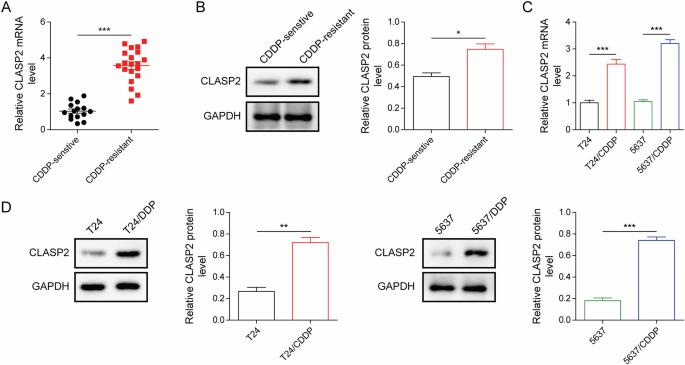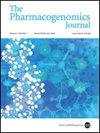KHSRP promotes the malignant behavior and cisplatin resistance of bladder cancer cells through the CLASP2/MAPRE1 axis
IF 2.9
3区 医学
Q2 GENETICS & HEREDITY
引用次数: 0
Abstract
Bladder cancer (BC) is a highly prevalent form of cancer worldwide, and cisplatin (CDDP) resistance poses a major challenge to patients. Cytoplasmic linker-associated protein 2 (CLASP2) is a member of the microtubule plus-end tracking protein family and is involved in the regulation of microtubule dynamics. In this study, we evaluated the influence of CLASP2 on BC progression and cisplatin resistance. Levels of CLASP2, HNRNPA1, NONO, ZRANB2, FUS, KHSRP and QKI in BC tissues and cells were tested by RT-qPCR. Protein levels of CLASP2 and KHSRP were detected by Western blot. Cell viability and IC50 of cisplatin-treated BC cells were measured by CCK-8. Cell proliferation and apoptosis were determined using colony formation assay and flow cytometry, respectively. RNA immunoprecipitation (RIP) and Co-immunoprecipitation (Co-IP) experiments were adopted to verify target genes of CLASP2. Cellular localization of CLASP2 and MAPRE1 was detected utilizing immunofluorescence staining. The xenograft tumor model was established in BALB/c nude mice. We found that iCLASP2 levels were increased in CDDP-resistant BC tissues and cells. Suppression of CLASP2 impeded BC cell proliferation and alleviated their resistance to CDDP. KHSRP positively influenced the stability of CLASP2 mRNA. There was a protein interaction between CLASP2 and MAPRE1. Silencing KHSRP or MAPRE1 reversed the effect exerted of CLASP2 on BC cells. CLASP2 decreased the sensitivity of BC to CDDP in vivo. Our results imply that CLASP2 contributes to tumorigenesis and cisplatin resistance in BC via targeting MAPRE1, thereby promoting BC progression and providing a new therapeutic target for BC treatment.

KHSRP通过CLASP2/MAPRE1轴促进膀胱癌细胞的恶性行为和顺铂耐药。
膀胱癌(BC)是世界范围内高度流行的一种癌症,顺铂(CDDP)耐药性对患者构成了重大挑战。细胞质连接体相关蛋白2 (Cytoplasmic linker-associated protein 2, CLASP2)是微管正端跟踪蛋白家族的一员,参与微管动力学调控。在本研究中,我们评估了CLASP2对BC进展和顺铂耐药的影响。RT-qPCR检测BC组织和细胞中CLASP2、HNRNPA1、NONO、ZRANB2、FUS、KHSRP和QKI的表达水平。Western blot检测CLASP2和KHSRP蛋白水平。CCK-8检测顺铂处理的BC细胞的细胞活力和IC50。采用集落形成法和流式细胞术分别检测细胞增殖和凋亡。采用RNA免疫沉淀(RIP)和共免疫沉淀(Co-IP)实验验证CLASP2的靶基因。利用免疫荧光染色检测CLASP2和MAPRE1的细胞定位。在BALB/c裸鼠身上建立异种移植瘤模型。我们发现iCLASP2水平在抗cddp的BC组织和细胞中升高。抑制CLASP2抑制BC细胞增殖,减轻其对CDDP的抗性。KHSRP正影响CLASP2 mRNA的稳定性。CLASP2和MAPRE1之间存在蛋白相互作用。沉默KHSRP或MAPRE1可逆转CLASP2对BC细胞的作用。CLASP2在体内降低BC对CDDP的敏感性。我们的研究结果提示CLASP2通过靶向MAPRE1参与BC的肿瘤发生和顺铂耐药,从而促进BC的进展,为BC治疗提供新的治疗靶点。
本文章由计算机程序翻译,如有差异,请以英文原文为准。
求助全文
约1分钟内获得全文
求助全文
来源期刊

Pharmacogenomics Journal
医学-药学
CiteScore
7.20
自引率
0.00%
发文量
35
审稿时长
6-12 weeks
期刊介绍:
The Pharmacogenomics Journal is a print and electronic journal, which is dedicated to the rapid publication of original research on pharmacogenomics and its clinical applications.
Key areas of coverage include:
Personalized medicine
Effects of genetic variability on drug toxicity and efficacy
Identification and functional characterization of polymorphisms relevant to drug action
Pharmacodynamic and pharmacokinetic variations and drug efficacy
Integration of new developments in the genome project and proteomics into clinical medicine, pharmacology, and therapeutics
Clinical applications of genomic science
Identification of novel genomic targets for drug development
Potential benefits of pharmacogenomics.
 求助内容:
求助内容: 应助结果提醒方式:
应助结果提醒方式:


